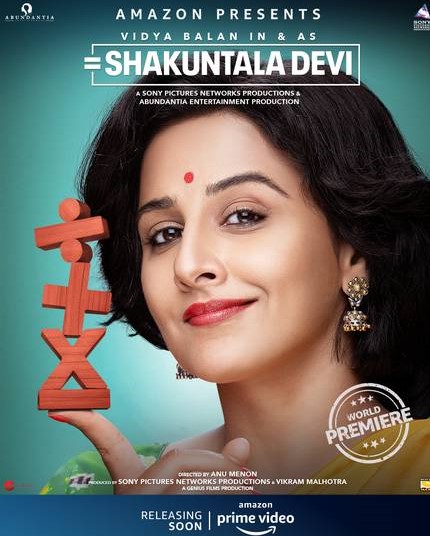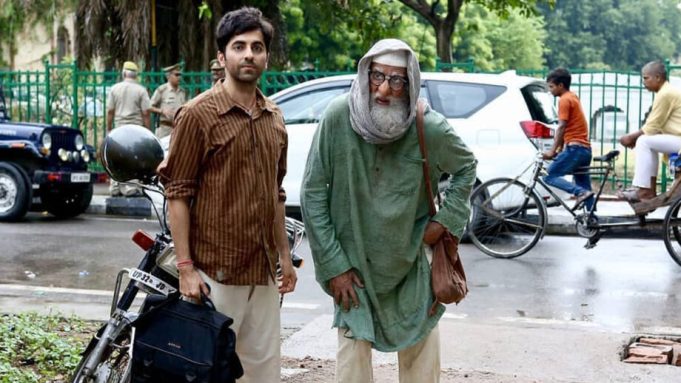The announcement of the premiere of Shoojit Sircar’s Gulabo Sitabo on Amazon Prime on 12th June, 2020 has kicked off a debate in film trade circles. While some believe that Rising Sun Films and Kino Works, the production houses behind the Amitabh Bachchan and Ayushmann Khurrana starrer, have done the right thing by going in for a premiere of their film on an OTT platform, there are others who are insistent that nothing could be more wrong than this. In the latter category are mostly exhibitors and multiplex chain owners who, in a manner of speaking, are feeling betrayed by this move. The fear is that premiering a film on an OTT platform may become the norm rather than remain the exception. Just this morning (15th May), Amazon announced that it would be premiering Shakuntala Devi, starring Vidya Balan, and produced by Sony Pictures Networks Productions and Vikram Malhotra.

Lockdown is an extraordinary situation which has prompted some producers like those of Gulabo Sitabo and Shakuntala Devi to announce their film’s premiere on Amazon Prime. Some more deals for premiering films on one or the other OTT platform are work-in-progress.
Says Vishek Chauhan, an exhibitor of Bihar-Jharkhand circuit, “Producers are justified as films are their products, their property. Since cinemas are shut, and nobody knows when they will reopen, it is good if producers can monetise and move on. Frankly, I wish them well. But if they can hold on for a theatrical release of their film, it will add immense value to their products. For instance, if their films are received well theatrically, the theatrical release will not only benefit them financially but the social impact of the success will also be huge. Just an online release of a film commoditizes it. Theatrical release makes it special, and a successful theatrical run makes the film a coveted product globally. In other words, producers can release films directly on an OTT platform, but they shouldn’t.” Producer Ramesh Taurani has a different view. He explains, “The current scenario has led to producers taking this decision of premiering their films online. In an ideal world, these films would release theatrically but since we are all still trying to figure out a way for cinemas to reopen safely, this seems to be the correct decision in the present scenario. Since majority of the content is being consumed online right now, it is the need of the hour in the pandemic situation, to release films on OTT platforms. After all, producers have their financial constraints and they cannot be expected to hold back their ready films beyond a point.” Holding a film entails holding cost in the form of interest on borrowed money, which, in the case of big-budget films, could run into crores of rupees every month.
However, exhibitor Devesh Tyagi (of Nandan cinema, Meerut) is clear in his mind when he declares, “This is a selfish move. Producers should show some solidarity and compassion towards the source which gives them their major revenue, viz. cinema owners. After all, cinemas are also suffering losses, just like producers are. Everyone is suffering losses together and so, everyone should persevere for a shared future.”
Ajay Bijli, managing director of PVR group, has a terse reply. Says he, “Picture abhi baaki hai mere dost!” Clearly, he is hurt by the action of the producers but is hopeful that cinemas will emerge victorious in the final tally or, in filmi parlance, in the second half. Karan Johar voices the opinion that “We (content creators) must stand by cinemas because cinema houses (multiplexes and single-screen cinemas) are the homes where films are screened.” He asks rhetorically, “We cannot abandon our homes, can we?” But Johar was unwilling to commit that producers would not premiere their films on OTT platforms (in an interview taken by your editor before the announcement of the premiere of Gulabo Sitabo on Amazon). Kamal Gianchandani, CEO of the PVR group, doesn’t mince words when he says, “As PVR, we believe, theatrical release is the best way for audiences to experience the labour and creative genius of our filmmakers. This has been so for decades and not just in India but globally. The current COVID crisis has caused unfortunate shutdown of cinemas and has created uncertainty. We are confident, once we get to the other side of this phase, there would be enough and more pent-up demand by cine goers who have been cooped up at home for the last many weeks. We are likely to see demand by force when we reopen. Needless to say, we are disappointed with the decision of the producers of Gulabo Sitabo to go straight to a streaming platform. We were hoping that the producers would accede to our request to hold back their film’s release till cinemas reopened. That said, this is not the first time, a film is being premiered on a streaming platform. Cinema exhibition has regularly faced competition from new emerging distribution platforms over last many years, and it has continued to enjoy cine goers’ patronage and affinity. I would also like to use this opportunity to express appreciation for all the producers who have publicly voiced their support for the theatrical platform and have decided to reschedule their releases to accommodate the reopening of cinemas.” Among such producers and filmmakers are Rohit Shetty, Karan Johar (both for Sooryavanshi), Kabir Khan and Shibasish Sarkar (both for ’83).
Inox lost no time in issuing a press statement when the announcement of the OTT premiere news of Gulabo Sitabo sent shock waves in the exhibition sector. The statement begins: “INOX would like to express extreme displeasure and disappointment on an announcement made by a production house today , to release their movie directly on an OTT platform by skipping the theatrical window run. The decision of the production house to deviate from the globally prevalent content windowing practice is alarming and disconcerting. Cinemas and content creators have always been into mutually beneficial partnerships. ….In these troubled times, it is disturbing to see one of the partners not interested in continuing the mutually beneficial relationship, especially when the need of the hour is to stand shoulder to shoulder with each other, and bring the film industry back to its vibrant best.” The Inox statement calls such content producers as “fair-weather friends” rather than all-weather life-long partners. In a tone expressing a confrontationist attitude, Inox adds that it will be “constrained to examine its options, and reserves all rights including taking retributive measures, in dealing with such fair-weather friends”.
The Producers Guild Of India was quick to take up the cudgels on behalf of the production sector. Soon after the Inox press release, the Guild issued a press statement which decried Inox’s veiled threats. “…At a time like this,” says the Guild statement, “it is disappointing to see abrasive and unconstructive messaging from some of our colleagues in the exhibition sector. Statements that call for “retributive measures” against producers who decide to take their movies direct to OTT platforms — especially at a time when cinemas are unfortunately closed for the foreseeable future — do not lend themselves to a constructive or collaborative dialogue on the way forward for the industry.” The press release adds, “The Producers Guild would like to emphasise that we are unequivocally and passionately supportive of the theatrical release of films, and a theatrical release will always be the preference for movies that were conceptualised as cinematic experiences. But these are unprecedented times for all the reasons mentioned above, and it is imperative to see things in that context. For producers to continue to keep “producing” the movies that light up our cinema screens, they need to continue to be in business in the first place. The production fraternity would like to work collaboratively with the exhibition sector to ensure that once cinemas do reopen across the country, we do all we can to bring audiences back in large numbers to experience our movies in the way they were always meant to be enjoyed — at the theatres.”
Shreyans Hirawat, whose company, NH Studioz, held the all-India theatrical distribution rights of Gulabo Sitabo, before the decision to forgo the theatrical release was taken, says, “We stand with the producers at this juncture. The justification for the action of the producers is circumstantial. Given the magnitude of the dilemma which the producers are facing currently, we feel, it is wise to go forward where the outcome is, at least, certain.” Harish Janiani, a leading distributor of C.I. circuit, talks in an emotional language when he says that stars (who are more or less producers of the films they act in nowadays) should not ignore the cinemas which have made them 100-, 200-, and 300-crore stars. “Revenue from every cinema counts, stars should not forget this,” he avers, adding that producers and stars should not desert exhibitors in these very difficult and trying times. Sandeep Kapoor, Punjabi and Hindi film actor and distributor, is extremely forthright in his comments. He explains, “Every year, hundreds of independent producers and distributors request programmers and exhibitors to give them shows for their small films but they (programmers and exhibitors) choose potential profits from big films instead of giving opportunities to small and often highly content-driven films. Now, Inox, PVR, Carnival should all know that KARMA IS A BITCH… Sorry to say that but now, everything is going to change.”
Change, in fact, is the only constant. The coronavirus pandemic has changed the scenario so drastically that there are many people who feel, everything will change. It will never be exactly what it used to be, is what the general opinion is. If that is so, how can the manner in which films are consumed by the public not change?





























